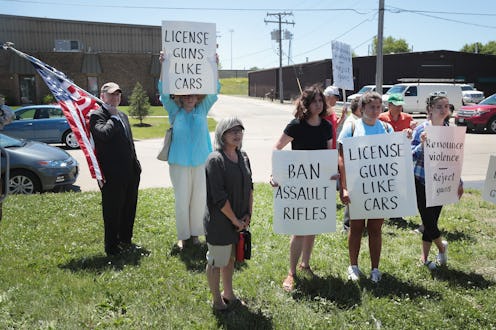News
A Leading Group Of Doctors Called Mass Shootings A "Serious Public Health Issue"

Following this weekend's horrendous mass shooting in Las Vegas, in which at least 59 people were killed and hundreds were injured, the American College of Physicians issued a statement calling mass shootings in America a "serious public health issue" and demanded a ban on automatic and semiautomatic weapons.
The American College of Physicians (ACP), a national organization of internal medicine physicians, issued its statement about mass shooting on Monday. In the statement, the organization noted that it is once again echoing its call for it to be classified as a public heath crisis:
Mass shootings, each seemingly worse than the one before, have become frequent and even common-place. Something needs to change. We must acknowledge that lack of a U.S. policy to address gun violence is the reason we have much higher rates of injuries and deaths from firearms violence than other countries. Specifically, we call for a ban on the sale and ownership of automatic and semiautomatic weapons. These are military-style “assault” weapons that were designed to kill as many people as possible as quickly as possible ... The College has been on the record for nearly 20 years about the need to address firearms-related injuries and deaths as a critical issue of public health ... In light of the rising number of mass shootings, this is a serious public health issue that needs to be addressed immediately by Congress.
The ACP is not the only organization which has called for mass shootings to be classified as a public heath issue in the United States. The American Public Health Association (APHA) has also called for a "comprehensive public health approach" to address the issue of gun violence. The organization noted the complexity of gun culture in America in advocating for this approach, saying:
The issue of gun violence is complex and deeply rooted in our culture, which is why we must take a public health approach to ensuring our families and communities are safe. We must place a renewed emphasis on improving gun injury and violence research.
Moreover, the Prevention Institute, a non-profit which focuses on preventing health and safety tragedies before they occur, also stressed the need for classifying gun violence as a public health issue due to its preventable nature, saying on its website that gun violence is "a critical and preventable public health problem. Gun violence is a leading cause of premature death in the country. Yet, unlike other preventable causes of death, we haven't mustered the political will to address it."
These organizations, as well as many more, suggested multiple actions that can be taken in order to address gun violence from a public health perspective, ones that hope to offer a more comprehensive approach to addressing this violence.
For example, the Prevention Institute has suggested that the National Institute of Heath (NIH) establish a National Institute of Violence Prevention to explore the root causes of and community solutions to gun violence. It also proposed that the Center for Disease Control (CDC) be allowed to make recommendations on how to reduce gun violence, something it is currently prohibited from doing, thanks to Congress. The institute also suggested that the CDC "develop its infrastructure so it can track, assess and develop strategies to prevent gun violence, just as we do with tainted spinach and influenza."
Moreover, in 2015, the ACP, in tandem with seven other professional health organizations and the American Bar Association (ABA), published a "call to action" paper on gun violence and suggested multiple ways in which this violence can be addressed. Some of these suggestions included requiring criminal background checks for all firearm purchases, allowing doctors to speak freely with patients about firearm ownership and access (and opposing laws that seek to prohibit doctors from doing so), pushing for improved access to mental health care, creating fairer public safety reporting laws that balance individual's rights with public safety, and banning assault weapons and large capacity ammunition magazines.
Similarly, the APHA has also called on Congress to pass what it calls "common sense" measures to reduce violence. These measures include: requiring and improving background checks for all gun purchases, providing funding for the CDC to research causes of gun violence, develop related prevention strategies, and expand data analysis related to its National Violent Death Reporting System, banning assault weapons, and preventing known or suspected terrorists from purchasing a gun.
It's clear that these organizations, as well as many more, have established strong evidence for why they believe gun violence in America constitutes a significant public health problem — and they have also proposed robust actions that can be taken to help address and remedy gun violence with a comprehensive, public health-centered approach.